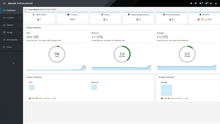Red Hat Virtualization
 | |
| Developer(s) | Red Hat, Inc. |
|---|---|
| Initial release | November 3, 2009[1] |
| Stable release | 4.4
/ August 4, 2020 |
| Written in | Java, JSP |
| Platform | x64-compatible |
| Successor | OpenShift |
| Type | Hypervisor |
| Website | www |
Red Hat Virtualization (RHV) formerly known as Red Hat Enterprise Virtualization, is an x86 virtualization product developed by Red Hat,[2] and is based on the KVM hypervisor.[3] Red Hat Virtualization uses the SPICE protocol and VDSM (Virtual Desktop Server Manager) with a RHEL-based centralized management server.[4][5] The platform can access user and group information from either an Active Directory or FreeIPA domain which enables it to allocate resources effectively based on permissions.[6] Built for use in enterprise datacenters, RHV can support up to 400 hosts in a single cluster and no upper limit on the total number of hosts it can support.[7] Development of RHV has ceased and as of August 2020 the product is now only receiving maintenance updates, with extended life phase updates provided until 2026.[8] The successor to RHV is Red Hat's OpenShift container platform.[9]
References
[edit]- ^ "Red Hat Virtualization Life Cycle".
- ^ "Red Hat Virtualization". www.redhat.com. Retrieved 2022-09-05.
- ^ Sobotta, Adrian T.; Sobotta, Irene M.; Gøtze, John (2010). Greening IT. Adrian Sobotta. pp. 109–110. ISBN 978-87-91936-02-9. Retrieved 2010-07-16.
Red Hat Enterprise Virtualization (RHEV) hypervisors and management tools for servers and desktops [...] The SolidICE virtual desktop intrastructure tools based on the KVM hypervisor are integrated into the RHEV Desktop edition [...]
- ^ Mamun, Al Mahmud Al (2022-06-25). "Red Hat Virtualization Review". Enterprise Storage Forum. Retrieved 2022-09-05.
- ^ Jackon, Joab (2009-12-09). "Red Hat open-sources desktop application protocol". ResellerNews. Retrieved 2022-09-05.
- ^ Martin, Nick (15 May 2018). "Red Hat Virtualization 4.2 updates include UI and DR enhancements". TechTarget. Retrieved 2022-09-05.
- ^ Sullivan, Andrew (2019-05-15). "Red Hat Virtualization 4.3 quick start". Red Hat. Retrieved 2022-09-04.
- ^ Mann, Tobias. "Ditching VMware over the Broadcom buy? Here are your options". www.theregister.com. Retrieved 2022-09-05.
- ^ Curry, David (2022-09-02). "Red Hat Launches Latest Version of OpenShift Platform Plus". RTInsights. Retrieved 2022-09-05.
